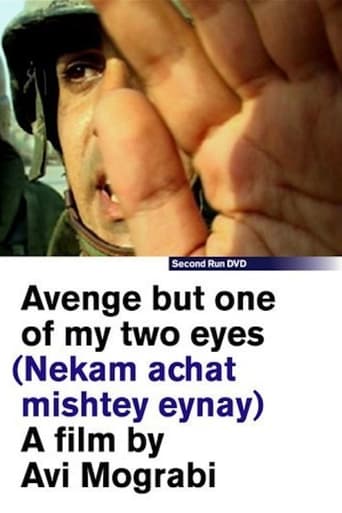mwert17
AS an Israeli I feel that the documentary has done much injustice to Israel in various levels.While the myth of Messada does exist,it is only significant to the extremists. The vast majority of Israelis ,including the Right wingers/Moderates (by Israeli definition) don't think in Messada's terms.Personally, I'm a peace activist (when I'm home).Needless to say that I sympathize with the daily difficulties the Palesinians go thru etc etc yet Mugrabi ignored the Israeli side i.e. living under a constant threat of terrorism ,smuggling bombs in (e.g.a Palesinian woman exploded a few minutes after avoiding a security check by claiming she had an operation in her leg and can't have a regular security check up because of the nail put inside) etc.So unlike the well treated Samson's myth /Palestinians motivations ,I feel that the explanation to the Israelis' is incomplete.Still,it's an interesting documentary and worth watching
Tadanga
The title comes from Samson's famous last prayer asking God to give him the strength one last time to take revenge. In a surprising exercise of symmetry, Avi Mograbi uses Jewish mythology to portray the Palestinian mindset. Against a backdrop of senseless daily persecution, Mograbi shows us lost people, clueless in a situation that nobody seems to make any sense out of. It is a fresh new approach void of the usual bloody violence and hatred, with no commentary or voice-over, where real-life people enact a macabre and surrealist play. It is this kind of documentaries that give me hope because I can see that there are still people in the midst of all this hatred that can still retain enough lucidity to recognize what they see for what it is : a shame. Two peoples with so much in common entangled in a death embrace that will consume them both. Just like the director of the documentary, we want to scream at them " What are you doing ?!"
dbs253
This movie was presented as part of the Jewish Film Festival in Sydney November 2005.Attendance was minimal, made worse by many viewers actually walking out in the middle of the movie, (mostly in scenes were Mr Mugrabi is talking to his Palestinian friend who we never see and keeps rubbing his nose - not very professional!)I do not know enough about filmatography, but as a lay person, it felt as if an amateur had filmed this. The camera was often not stable, which maybe can be forgiven taking into account that this documentary was often filmed in unusual circumstances.But the film definitely scores in delivering a point:Scenes taken at Masada, with the guides proudly explaining how a small group of oppressed zealots fought a mighty roman army until they knew that their cause was lost and sacrificed their lives rather than endure the humiliation of defeat and possible slavery or worse. The oppressed become the oppressors in the other scenes, were soldiers in the Israeli defense force and the newly erected fence strongly disrupt Palestinian lives. The irregular opening of the gates to the fences causes their crop to rot, children to wait for hours to return home from school and generally humiliation at having to be constantly searched and harassed. (To the point of being forced to stand for hours on a stone)And then Avi speaking to his friend about life and the value of living. Is it possible to understand the suicide of the zealots and not the suicide bombers who feel they have nothing much to lose? Just limiting ourselves to the Masada scenes, it is interesting to see the different groups answering the question about if Jewish law allows suicide. The answers varied from "It is forbidden, but the reasons the zealots had were valid exceptions" to "The zealots were not religious and their suicide was not justified at all"Then there is the justification of the suicide bombers. To me it is a terrible vicious circle. That fence would not be there if it were not for suicide bombers. Yet the humiliation and hardship it causes may just push some more Palestinians into it.As to the soldiers, I felt pity for them, even if their acts do not seem justified. Once upon a time I was one of them, and in Gaza, as much as I hated it, I knew that if we did not react firmly to a stone thrown at us during patrol, the next time it would be a grenade. I do hope more people do sit through this movie. It might not be easy to watch, but it should make people think, and maybe also look at the situation from the "other" side.Once the majority on both sides are able to understand the other side of the coin, maybe there will be a chance of lasting peace. Although I am more optimistic about it than I was 4 years ago, I wonder if it will happen while I am alive....
